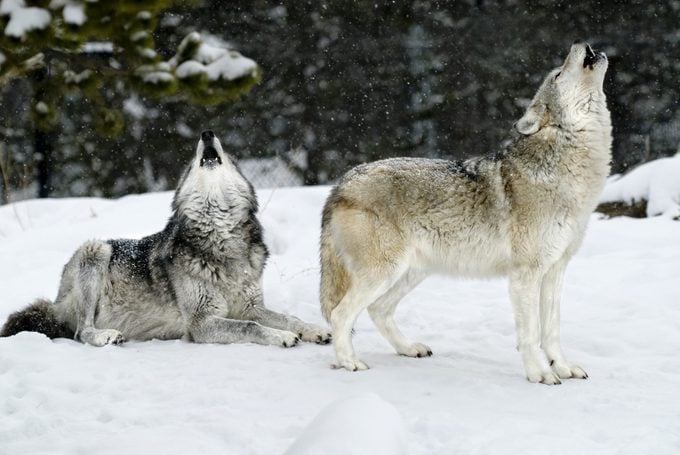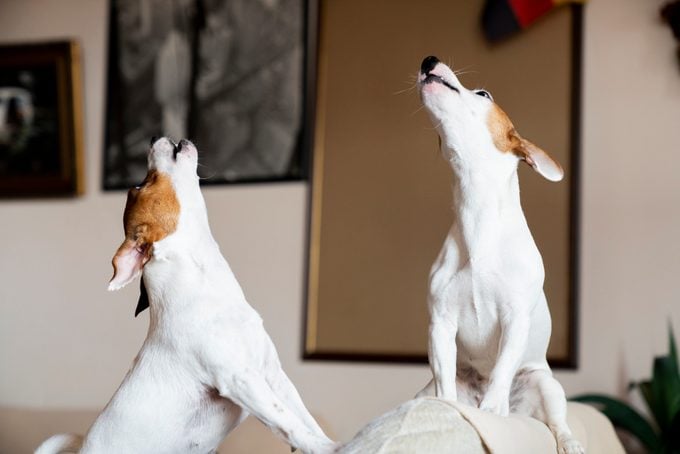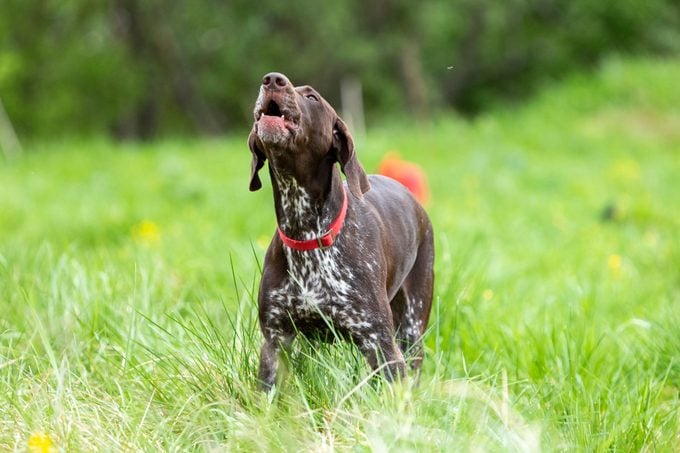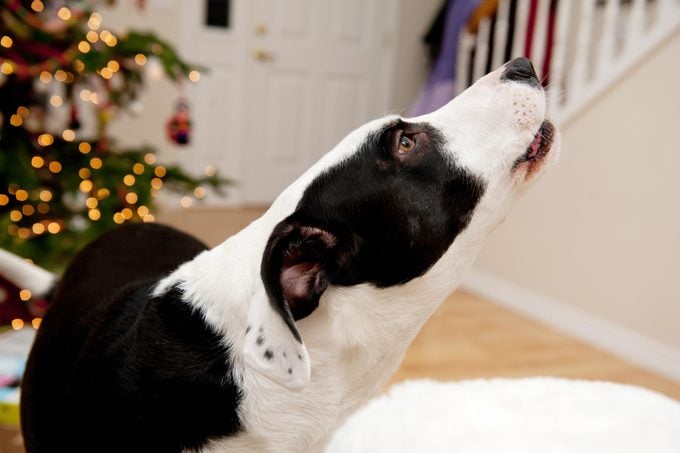Why Do Dogs Howl? 6 Top Reasons Your Dog Howls
Updated: Apr. 14, 2024

Howling is a verbal clue as to what's really going on with your pup. Here, experts explain why dogs howl—and how to stop it if it's becoming too much.
Some dog behaviors are easy to interpret, like the pleading look your pup sends your way when you’re eating a juicy hamburger. (Translation: “Gimme a bite.”) But the long, doleful sound your dog makes on occasion? That’s downright perplexing. So why do dogs howl, exactly?
Oddly enough, there isn’t much data on why our pupsters howl, but there is some data regarding when dogs howl. “In other words, what matters most is the context in which howling is more likely to occur,” says certified dog behaviorist Mindy Wiate, PhD, a clinical assistant professor of animal behavior at Carroll University in Waukesha, Wisconsin. Observing what’s going on when your dog howls may help you get to the bottom of your woofer’s loudest pastime.
Reader’s Digest talked to two canine behaviorists and a veterinarian to get the lowdown. Ahead, they’ll explain the reasons dogs howl, how you should respond to this canine noise and ways to stop a dog from howling when the wails become too much.
Get Reader’s Digest’s Read Up newsletter for more pets, humor, travel, tech and fun facts all week long.
About the experts
Reviewed for accuracy by: Wailani Sung, MS, PhD, DVM, DACVB, a board-certified veterinary behaviorist who provides behavioral consultations at the Behavior Specialty Clinic located at the San Francisco SPCA. |
Why do dogs howl?

Canine experts don’t fully understand the reasons dogs howl, but the wolf, the dog’s ancestor, offers clues. Wolves use howling to communicate across long distances, like when one wolf has broken off from the rest of the pack. “Part of its function is believed to be communication during separation,” says Waite.
Most experts agree that communication is a central theme when it comes to dog howling too. “At the end of the day, dogs are extremely social and will use howling as a tool to communicate and get attention,” says veterinarian Jaclyn Coble, DVM, founder of Sea Legs Integrative Veterinary Health in West Roxbury, Massachusetts.
1. It’s in their genes
Dog howling is known to be a genetic predisposition. Dog breeds that are closely related to wolves are more prone to howling as a form of communication than newer dog breeds. “One example of this would be hound dogs, who are known to howl more than bark because it was considered to be more useful for hunting,” says Dr. Coble. When a hunting dog sniffs its way to the targeted prey, it howls to mark its location. Its owner and the other dogs in the pack can find it (and the animal it was chasing) by sound.
Although most hounds these days spend more time playing in the backyard than hunting, the breed standard still pushes for traits that would make them successful hunters. “Some dogs, like beagles, are highly communicative and use howling and barking to communicate as a result of century-long selective breeding for scent hunting,” she says.
What you should do
The occasional short howling session is nothing to worry about, especially if the breed is genetically wired to communicate via howls instead of barks. “While howling is part of some dog breeds’ repertoire of communication, the most important aspect for humans to consider is: Why is the dog howling?” says Renee Rhoades, a certified dog behaviorist at R+ Dogs, a virtual dog behavior consultancy. “Ask yourself questions like, ‘Is there an emotional component behind this communication?'”
For example, could your dog be lonely (more on that below), or is it just howling to say “hello” to the dog it sees outside the window?
2. They miss you

For some doggos, howling is the equivalent of lighting the Bat-Signal when they’re experiencing separation-related distress. You might hear them howling when you walk out the door or receive concerned texts from your neighbor, who’s been listening to the howling for hours. Dogs are social animals, and some pups—like so-called velcro dogs that follow their humans everywhere—crave attention even more than others. Human interaction is critical to their overall health. So when you leave them alone, they may howl to express their sadness or loneliness.
What you should do
“I recommend [that] pet parents whose dog howls while separated take a video of their dog and work with a professional to assess the pet for separation distress,” says Waite. “We’re typically looking for specific types of behaviors, such as barking, howling, drooling, stress panting, scratching at doors/crates, digging at floors, ignoring food, [exhibiting] wide eyes or large pupils [or having] certain types of movement and movement patterns.” Also note how quickly the behavior starts, how long it lasts and whether and how often the behavior loops.
Typically, you can mitigate dog howling with desensitization training. In this scenario, you gradually get your dog comfortable with your leaving. We’re talking tiny increments here—first, you might train your dog to be OK with you getting up from the couch. Reward each session with a treat. Once your dog is used to that, you could work on departure cues, like going to the door and then picking up your keys or wallet. Don’t immediately jump to leaving the house!
“Work on gradually building up these departure cues into longer durations, but always start off very short and sweet so that the dog does not experience distress or the distress is very low-level and tolerable,” advises Rhoades. When you finally depart for longer sessions, don’t forget to leave a treat-dispensing toy and doggy puzzle to keep your dog busy.
3. They don’t feel good
Dogs typically whine and whimper to express pain, but dogs that are in a crate and not feeling well are particularly prone to howling. After all, they can’t come to your side for help. In addition to howling, you may notice other signs your dog isn’t feeling well, such as restlessness, excessive panting and licking, loss of appetite and lethargy.
What you should do
If you suspect that your howling pupster is in pain or otherwise not feeling well, call your veterinarian. One clue your dog may be sick: It’s uninterested in eating.
4. They hear a siren
Why do dogs howl when they hear a siren? It’s a familial thing. “Studies indicate that sirens are acoustically similar to the howling of both wolves and dogs, and therefore wolves and dogs likely howl at sirens simply because of this similarity,” says Waite.
What you should do
There’s no need to be concerned by this type of dog howling. “I don’t believe the dogs are distressed or in need of support or assistance,” says Waite. All you have to do is show a little patience. After all, this type of dog howling is usually short-lived and stops once the sirens have passed.
5. They’re excited

Some dogs (we hear you, hounds) go bonkers when they see another dog. They may howl and stare at the other dog outside the window. But they could have the same high-energy excitement when they are happy to see you when you get home from work. They show it by jumping up on you and licking your face. And this unbridled enthusiasm is often joined by a dog-howling performance that’s essentially a form of social communication.
What you should do
Granted, sometimes it’s super cute to watch and hear your dog howl. Other times? Not so much, and your nearby neighbors would probably agree. “If the howling is a problem for you and/or if the dog seems distressed by the stimulus causing it to howl, then you’ll want to note what the stimulus is and work through your dog’s reactions with a behavior professional,” says Waite. “This may entail managing the presentation of that stimulus or changing how our dog feels about that stimulus.”
Dealing with a doggo that’s super excited to see you or another pup … and howling up a storm as a result? Stay calm, then redirect its behavior, Waite suggests. “We can help to calm them down by engaging in activities that are opposite of the howling,” says Rhoades. “That would be something like scattering food and encouraging the dog to use their nose.”
6. They have to go potty
When you’re home with your pet and it has to go potty, the signs are pretty clear. Your dog may pace or stare at you until you get the message. But when dogs are left alone for longer periods of time, there’s no one for them to alert to their bathroom needs. If your neighbors have told you that your dog is howling, or if your doggy video surveillance shows them howling later in the day, it could mean your pet has to go potty, Waite says.
What you should do
The answer seems obvious: Let them go to the bathroom! But putting that plan into motion isn’t easy when you are away. “I always recommend pet parents use dog walkers to let their dogs out if they are going to be gone more than four hours,” says Waite. In addition to emptying their bladder, they’re getting some exercise and much-needed social interaction, which goes a long way when it comes to mental health enrichment—and might save your pillows from getting chewed up. Another option: Train your dog to use a pee pad.
What to do if you don’t know why your dog is howling

Dog howling can be a challenge to get to the bottom of. If you’re not sure what the source behind your dog’s howling is, it may be time to get more help. “Changing the dog’s emotional response to a stimulus involves behavioral modification, and this really should be addressed by a professional directly,” says Rhoades.
Enlist the help of a certified professional dog trainer or canine behaviorist who uses positive reinforcement to change canine behaviors. You’ll learn how to meet your pup’s needs and how to help reduce the frequency of its howling. Best of all, you’ll get peace of mind—and a break from howling.
Why trust us
At Reader’s Digest, we’re committed to producing high-quality content by writers with expertise and experience in their field in consultation with relevant, qualified experts. For this piece, Lisa Marie Conklin tapped her experience as a longtime pet journalist, and then Wailani Sung, MS, PhD, DVM, DACVB, a board-certified veterinary behaviorist with the Behavior Specialty Clinic at the San Francisco SPCA, gave it a rigorous review to ensure that all information is accurate and offers the best possible advice to readers. For this piece, we relied on reputable primary sources, including a veterinarian and certified dog behaviorists. We verified all facts and data and backed them with credible sourcing, and we will revisit them over time to ensure they remain accurate and up to date. Read more about our team, our contributors and our editorial policies.
Sources:
- Mindy Waite, PhD, CAAB, CPDT-KA, certified dog behaviorist at Senior Tail Waggers and clinical assistant professor of animal behavior at Carroll University; email interview, Feb. 12, 2024
- Jaclyn Coble, DVM, CCR, CVA, veterinarian at Sea Legs Integrative Veterinary Health in West Roxbury, Massachusetts; email interview, Feb. 6, 2024
- Renee Rhoades, MSc, BSc, Adv.Dip, FFCP, certified dog behaviorist and founder of R+Dogs; email interview, Feb. 13, 2024


